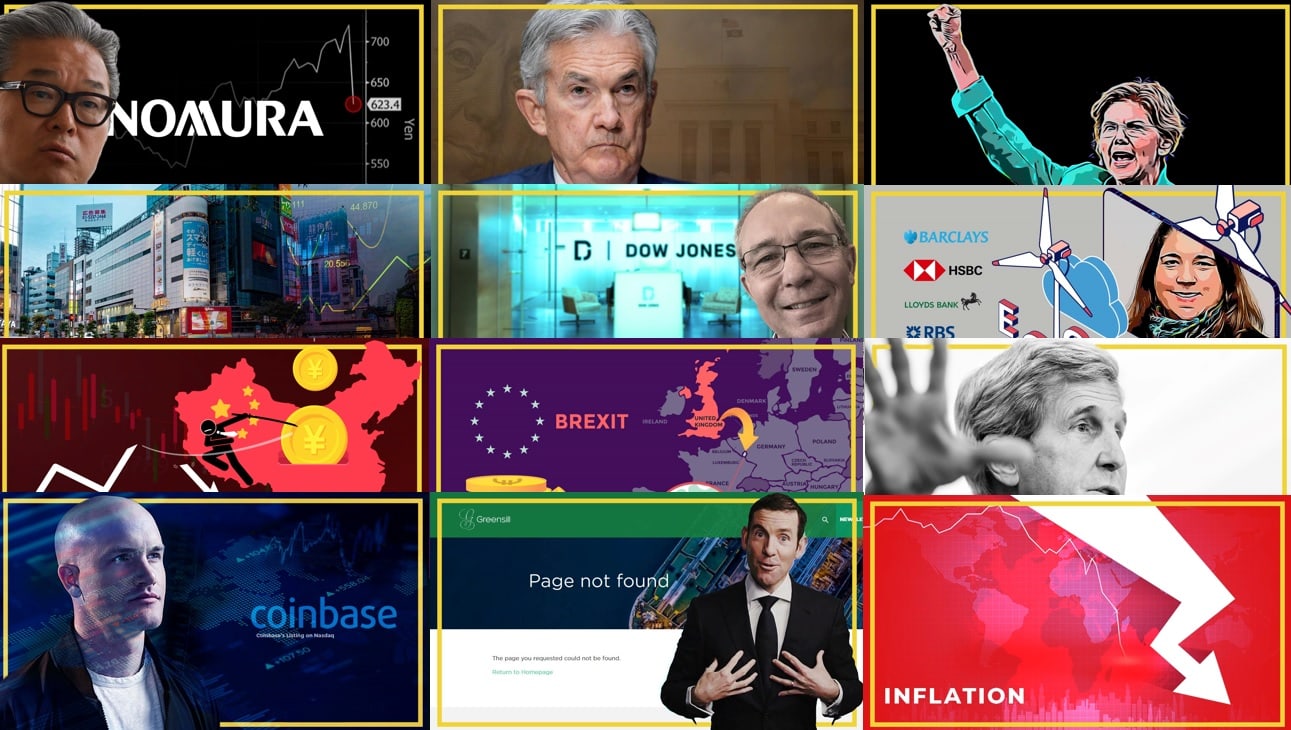Disruptors can come in many different forms or shapes. They can be individuals or things including trends, and even social media groups. In our story today, we discuss the seven major influential disruptors of investment banking in 2021 so far.
According to the Cambridge dictionary, these disruptors prevent something, especially a system, process, or event, from continuing as usual or as expected.
One year on from the first major lockdowns over the world, has the way that a disruptor is perceived by others changed? Some of the disruptors we are writing about today have aspects of foolhardiness, other disruptors have maybe been underestimated.
Covid-19 itself, was the most influential disruptor to hit Investment Banking in living memory. Perhaps the pandemic has also overshadowed other disruptors, leaving them looking less significant in comparison?
Easter 2021 is Special. Not just because for many it will be the second year of the new reality. This Easter will also be special because so much more of what we (the ‘zoom generation’) do or see is now influenced by the news we see online. Just like this story you are reading now, whilst waiting for your next Easter egg hopefully.
And, like our interview with Dow Jones from a few weeks ago. Today it is not just central banks who are increasingly experimenting with concepts such as ‘nowcasting’:
“News includes not just information”, Simon argues, “but sentiment”#Nowcasting #DowJones #CentralBanks #AlternativeData #Norges #Covid #ESG #SentimentIndicatorhttps://t.co/bMgQQnm6yp
— #DisruptionBanking (@DisruptionBank) March 18, 2021
Nowcasting is just one of the ways that banks are using news data to improve their economic forecasts and obtain a more immediate insight into market conditions. Disruptors can highly influence market conditions. It is useful to keep an eye on them.
Nearly everybody is looking for news and increasingly ‘sentiment’. Be that here, on Instagram or even Clubhouse more recently.
On the topic of news and sentiment. On March 20thGeoffrey W.S. Okamoto, First Deputy Managing Director of the International Monetary Fund (IMF) spoke at a Forum.
“In January, we projected 2021 global growth at 5.5 percent, but prospects of a stronger recovery are emerging – because of additional fiscal stimulus, especially in the U.S., and the prospects of broader vaccination.
“However, the global recovery has been incomplete and unequal.” Okamoto added.
“We project that cumulative income per capita in emerging and developing countries, excluding China, between 2020 and 2022 will be 22 percent lower than what it would have been without the pandemic.”
“As I said, uncertainty about the recovery is exceptionally large.”.
Okamoto concluded by ceding that these challenges are daunting, and highlighted some priorities. All of these priorities, however, are vulnerable to disruption. Disruption can lead to further turbulence.
Just like you can refer to sentiment as ‘refined opinion’ or ‘a specific view or notion’. Today, #DisruptionBanking reveals it’s refined opinion about who might be the most influential disruptors of investment banking so far in 2021.
The Seven Most Influential Disruptors
This list in no way represents the opinions of the Publisher, and are simply the refined opinion of the editorial team. The order is by global and to some extent monetary significance, the amount of time that the disruptor has been influential is also considered.
It is a list that cannot start without the biggest disruptor of 2021 so far:
Covid-19 and The Vaccine Rollout (1)
This March, Jamie Dimon, CEO of JPMorgan, said in an interview with Bloomberg that “There’s a very good chance you’re going to have a gangbusters economy for the rest of this year and easily into 2022.”
And last week, Andy Haldane, Chief Economist at the Bank of England said: “If some of those savings (saved by families during the pandemic) do get spent, even a small amount of them, we’re talking about a pretty rip roaring recovery. When it comes, it will come fast, and it will be large.”
Amongst all the optimism, there is just one disruptive element. The progress of the Vaccine Rollout. And the exact moment this recovery starts to kick in.
Latest news from countries like Vietnam are promising. #VaccinesWork
✅First shipment of 811,200 #COVID19vaccines supported by #COVAXFacility arrived in Viet Nam
— UNICEF Viet Nam (@UNICEF_vietnam) April 2, 2021
Read more at: https://t.co/tLdX5TsNCm@UNICEF_EAPRO @UNICEF @WHO @gavi pic.twitter.com/MhUTFZuu3S
These stories show that global collaboration is working. Perhaps one day we will even reach the new normal. For some, especially in investment banking, It also means that the future may start to be a little more predictable again.
For now the pandemic remains the most influential disruptor of investment banking in 2021 so far.
Sustainable Development Goals and ESG (2)
January’s change of leadership in the U.S. has been followed by a renewed focus on the Sustainability agenda, and on the Paris Agreement. In his annual letter to CEOs, the influential Larry Fink, Chairman and Chief Executive Officer of BlackRock, wrote about the colossal sums needed through global collaboration in order to achieve net zero by 2050.
Editor-in-Chief @business John Micklethwait talks with Larry Fink, Founder, Chairman & CEO @blackrock about climate and his annual letter. "We believe it's going to take tens of trillions of dollars to mitigate the carbon impact on our economies." #TheYearAhead pic.twitter.com/9KZdt43WY7
— Bloomberg Live (@BloombergLive) January 27, 2021
Significantly, Finks highlighted in the letter that:
“From January through November 2020, investors in mutual funds and ETFs invested $288 billion globally in sustainable assets, a 96% increase over the whole of 2019.”
In an interview at the World Economic Forum a little later, Fink shared that he believed that “We are going to need $50 trillion in investing to get to a net zero world.”
Multiple global banks had already or have since also stepped up their commitments to reach net zero banking. Many still believe that much more needs to be done.
Putting an amount against the investment needed to reach net zero has influenced the way that investment banks approach ESG forever.
Wallstreetbets (3)
Recently, Coutts Head of Asset Management, Mohammad Kamal Syed pointed out that:
“A key factor in the story (about WallStreetBets and GameStop) is the role of online ‘influencers’. Popular posters in investment groups on the website Reddit spotted the weakness of the short position and encouraged their followers to buy the stock.“
Some hedge funds were down a reported $19 billion on GameStop stock. It highlighted a blind spot in some of the investment strategies of many professional traders, many of whom were just starting to exit positions in Tesla and other Tech firms.
The continued rise of the retail investor has hugely influenced investment banking in 2021 so far. The rise may have started in 2020, but the wallstreetbets story impressed on Wall Street just how influential retail investors can be as disruptors of investment banking.
Bitcoin (4)
When Tesla bought $1.5 billion of bitcoin back in early February, it felt like crypto had finally hit Wall Street. In March, Citi published a report where they highlighted how ‘bitcoin was shifting from being primarily a retail-focused endeavor to something that looks attractive for institutional investors’.
This week BlackRock was in the news for trading bitcoin futures. BNY Mellon have been offering bitcoin services since February. Other investment banks are offering similar services.
Amidst rising institutional interest, the future salary of the CEO of Coinbase, Brian Armstrong‘s was touted to be a whopping $1 million / day salary. Of course, it is conditional on the successful IPO of Coinbase, but that looks as good as confirmed. It dwarfs the salaries of every CEO of every investment bank in the world.
Are there really any job sectors in the world left where you could accrue that level of remuneration per day?
— #DisruptionBanking (@DisruptionBank) March 5, 2021
Welcome to the Disruption unfolding in Investment Banking #digitalfintechcareers #disruptionbanking https://t.co/M7Uhz168k9
February also saw bitcoin reach $1 trillion in market value. The market value of bitcoin has grown by more than $400 billion in 2021 so far.
“A decade of low rates has meant there is a great deal of money available for investors and, arguably, the availability of investments hasn’t kept pace,” says Coutts Head of Asset Management, Mohammad Kamal Syed. “This makes alternative assets like Bitcoin attractive, especially when bond returns are so low.”
The fear of inflation coupled with a lack of clear investment opportunities has undeniably helped bitcoin become more influential. The embracement of crypto by the investment banking community is likely to continue through 2021, and will probably push the market value of bitcoin ever higher.
Brexit (5)
The City of London has been one of the biggest losers in the Brexit saga. First Amsterdam started trading the largest volumes of any stock exchange in Europe, including London. We also wrote about how Dublin had benefited by having 115 of the 330 firms relocate to the Irish Capital from London following Brexit.
In another story we wrote about how in November 2020, the Bundesbank had reported that overall, banks had shifted ‘balance sheet items’ of €278 billion to Germany and wanted to increase this amount to €675 billion by the start of 2021.
Britain continues to position itself as a Tech Nation as well as a respected financial services hub. As the vaccine rollout gains pace across the UK, things are looking better for Britain and the Pound than many had hoped.
Recent negotiations between Britain and the European Union have brought better news to finance firms in the City of London. They have agreed on a new forum to discuss market regulation. Firms could eventually win back some access to the single market if discussions go well.
Brexit has been hugely influential as a disruptor of investment banking not just in Europe but across the world. Banks have had to show discipline and restraint, in order to survive the disruption that Brexit has wreaked on markets.
Lex Greensill (6)
There is the spectre of some senior departures at Credit Suisse to consider before examining the disruption caused by the man from Australia, Lex Greensill.
Some reports suggest that the saga will cost Credit Suisse their entire profit for this year. The bank have also replaced their asset-management head.
Their mission is to turn corporate invoices into an investable asset class. #Greensill buys invoices from companies and bundles them together into securities, which clients of @CreditSuisse and other institutions can then purchase. Sound familiar? https://t.co/5IPy1lPsPS
— #DisruptionBanking (@DisruptionBank) March 15, 2021
Last week Credit Suisse still owed investors $5 billion. If Credit Suisse face difficulties returning this money, it might damage customer relations and could lead to withdrawals from the $1.6 trillion the bank manages.
Closer to home in the UK, Greensill’s main client Sanjeev Gupta, Chairman of GFG had a $234 million bailout request rejected this week. There is still more disruption ahead for many banks because of Greensill.
The Greensill saga continues to disrupt Credit Suisse and has shown new CEO, Thomas Gottstein, that he may have underestimated the amount of work he has to do.
Bill Hwang’s Archegos (7)
The replacement of the asset-management head and the suspension of bonuses, for senior executives at Credit Suisse, are just the start of the changes we might see. Archegos will be even more influential.
Who is Bill Hwang, and now much disruption will Archegos cause investment banks around the world?
— #DisruptionBanking (@DisruptionBank) March 29, 2021
Find out more with #disruptionbanking, bringing you quality content, the most important news in banking, free: https://t.co/7ziv0YdfZt
Bill Hwang, CEO and Founder of Archegos Capital Management, used leverage from across global banks to build his family office into a whale with positions that may have topped $50 billion.
Goldman Sachs had already seen and acted upon warning signs in 2018, but ultimately failed to curb the ambitions of some of its investment bankers. Other investment banks also continued to work with Archegos.
More than $20 billion in holdings linked to Archegos Capital Management liquidated in days. Nomura Holdings Inc., Credit Suisse Group AG were the most affected by the fallout.
The Archegos scandal has also affected leading Chinese tech stock valuations. Nomura, listed on the Japanese stock exchange, saw their share price dropped by 16% on the day the news broke. Credit Suisse’s share price didn’t fare much better on the Swiss stock exchange. And the ripples continue to form around the story with more news surely to follow after the Easter break.
Hwang was already an influential disruptor of investment banking back in 2014. Back then, he was banned from trading in Hong Kong for 4 years.
Other Influential Disruptors
Some people have argued that Elon Musk should be added to the list of influential disruptors. And, yes, his shrewd investment into bitcoin has had an effect on investment banking.
In the meantime, Tesla’s stock price has been less than compelling. A lot of investors have been selling Tesla and other Tech shares:
Not often you hear stories like this, brave of the investment team at @BaillieGifford to be so open about their strategy:#disruptionbanking https://t.co/DGHZQZ94cd
— #DisruptionBanking (@DisruptionBank) February 21, 2021
Tesla stock is trading 5% down since the turn of the year. It did peak in January, but has collapsed to earlier levels since and there is not much sign of improvement for now.
Elizabeth Warren’s reaction to the actions of Robinhood CEO, Vlad Tenev were notable for the media attention and sentiment they created. Two individuals who in their own way are highly influential disruptors.
Mario Draghi is someone who may yet surprise investment bankers in 2021. Others have suggested Cathie Wood is another one to watch.
2021 will see Covid-19 and the vaccine rollout as the most influential disruptors of investment banking. Inflation will continue to be a concern, and may well be the big disruptor later in 2021. But Inflation hasn’t caused significant disruption just yet. Maybe that will be a story for another day.
Author: Andy Samu
#MarginDebt #MarginCall #Nowcasting #Disruptors #InvestmentBanking #Stimulus #Inflation #ESG #Brexit #Bitcoin #Greensill #NetZero #Archegos #Covid #Recovery #VaccineRollout #WallStreetBets
















15 Responses